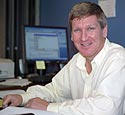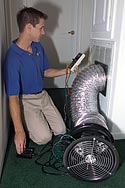
| Issue No. 2: January 2005 |
|
|
|
|||||||||||||
TOP STORIES
On January 3, just a few hours after beginning his first day as FSEC’s new director, Jim Fenton talked with us about his new position.
“Well, let’s think about that. I’ve been called a ‘dreamer’ on more than one occasion, so let’s review how my dreams for the year might have turned out. During the year, we hired four new people to work with us on our research staff. They’re serving in tenure track faculty positions, and are affiliated with academic departments on the UCF campus, though they’re doing all their research right here at FSEC. I see quite a few new graduate students working in our labs. Faculty members both at FSEC and on the main campus are serving on their committees and advising these students. We’ve held several programs in a new seminar series that has brought in some distinguished speakers – in fact, we found a couple of our new researchers in this group when they came down as invited presenters. The guest speakers have spoken to the faculty on the main campus and have come over here to talk to our staff and even give presentations to the general public. I think we’ve accomplished a lot of
things in-house as well, ranging from filling some key positions
that have been “interim” for a while to getting some
exciting new education programs going and bringing in representatives
of industry and other energy organizations to talk about our plans
for the future. We’ve had legislators, government officials
and others all in our building, learning about our activities and
sharing their own plans and goals with us.” <Full
Story>
Two Builders' Show Houses Benefit from FSEC Assistance
FSEC is playing a key role in two show houses on display at this year’s International Builders Show held in conjunction with the National Association of Home Builders’ (NAHB) Annual Convention in Orlando January 13-16. Two of the show’s demonstration houses have been developed with the assistance of FSEC buildings division researchers. The Not So Big Show House – actually
a house larger than 2500-square-feet -- received building science
technical assistance from two of the Department of Energy’s
Building America teams, FSEC and Steven Winters Associates. FSEC
staff made recommendations for locating this home in Florida’s
hot and humid climate and adapting it for the best mechanical and
ventilation systems. Researchers have also conducted air-tightness
tests on the house and are monitoring its energy usage to verify
the energy-efficient features are working as projected.
Staff members in FSEC’s PVDG Division recently completed the design, installation and monitoring of a new photovoltaic system at a unique environmental educational facility located near Washington, D.C. The system is powering a residential-based overnight education building that thousands of students, teachers and parents visit annually. The facility, which is operated by the Alice Ferguson Foundation, a nonprofit education organization based at the Hard Bargain Farm Environmental Center, serves more than 10,000 students from the D.C. area annually at the farm and regional National Parks. Students and their teachers spend a day or more learning about the natural environment, farming and the cultural heritage of the Potomac River watershed in a variety of educational programs, science camps and special events. In mid-November, FSEC staff members Jim Dunlop and Donard Metzger completed acceptance tests and installed data acquisition equipment for a 12-kWp interactive PV system that will provide an estimated 75 percent of the energy needs for the farm’s Wareham Lodge. FSEC worked with the foundation staff in conducting
site surveys and developing project bid specifications, facilitating
meetings with the local utility and code officials on installation
and interconnection matters, helping review bids and selecting a
contractor, conducting final acceptance for the PV system, and installation
of data monitoring equipment. Thornbloom Conducts Hot Water Workshops in Barbados
FSEC’s Mark Thornbloom and solar industry member Jim Ogle of DKF Distributors were in Barbados recently to conduct solar domestic hot water installer workshops. During their two weeks in the country, Thornbloom, a senior research engineer at FSEC, and Ogle rode along on service calls and installations with technicians from Solar Dynamics, the company that contracted with FSEC to conduct the program. They also helped evaluate a new collector
mount and developed more effective, hurricane-resistant techniques
for mounting the collectors, using locally-available materials.
The trainers conducted hands-on labs to introduce the new methods
to the technicians. <Full
Story> Used Automobile Oil Source of Hydrogen
While the phrase “Hydrogen Economy” is heard often these days and is widely anticipated by people who hope to see our world function using renewable energy resources, all agree that a lot of complex preparatory work still needs to be done. One of the more interesting FSEC hydrogen projects going on now deals with a unique way to produce hydrogen. Dr. Ali Raissi and Karthikayan Ramasamy are developing a process to produce hydrogen based on reformation of used automotive lubricating oils. Used lube oil – often considered just another substance to be disposed of – can be valuable when recycled as a re-refined lubricant or as an energy source. Each year, Floridians generate more than more than 45 million gallons of used lubricating oils. Typically, used lubricating oil is delivered at a cost of 10 cents per gallon, making it a potentially inexpensive source for local production of hydrogen. Since lube oil contains a complex mixture of higher hydrocarbons, it is very difficult to break it down using thermal energy alone. At FSEC, Raissi and Ramasamy have built a thermocatalytic reactor that uses supercritical water to accomplish reformation of lube oils. Water becomes a supercritical fluid at temperature above 374.2°C and pressure over 22.1 MPa. In the Supercritical region, densities are a fraction of that of normal liquid water, while solubility behavior is closer to that of high-pressure steam. To date, FSEC researchers have operated this system successfully and have demonstrated that hydrogen can be produced by using the supercritical water reformation method. To view a video showing the laboratory apparatus
and an animation of the FSEC process for producing hydrogen from
used lube oil, click here.
NEWS NOTES Florida Solar Energy Center Awards $4.85 Million to Universities to Continue Hydrogen Research for NASA The Florida Solar Energy Center (FSEC) has awarded $4.85 million to Florida universities to conduct hydrogen research. The new awards will allow university researchers to continue work on existing projects and begin research on fuel cells for flight. Universities participating in the program are Florida A&M University, Florida International University, Florida State University, University of Central Florida, University of Florida, University of South Florida and University of West Florida. This multi-year, multi-million dollar project is funded by grants from NASA Glenn Research Center with the objective of supporting NASA's hydrogen-related space and space launch activities. The total funding for this year's NASA Hydrogen Research at Florida Universities was $7.275 million. FSEC is co-program manager with the University of Florida. Florida Green Local Government Standard Release Florida city and county governments can now become
certified "green," thanks to a For the complete story, click on the news release
link below. Florida Green Local Government Standard Release Florida city and county governments can now become
certified "green," thanks to a For the complete story, click on the news release
link below. FSEC Receives Contract to Improve Efficiency of Central Air Conditioners The Florida Solar Energy Center (FSEC), under
funding from the State Technologies For the complete story, click on the news release
link below. FSEC Receives Contract to Expand Building Energy Simulation Program The Florida Solar Energy Center (FSEC) has received
a $252,000 contract from the The program is being developed by the U.S. Department
of Energy, Lawrence Berkeley For the complete story, click on the news release
link below. Early Holiday Gifts for Universities as Florida Solar Energy Center Awards $4.85 Million to Continue Hydrogen Research for NASA The Florida Solar Energy Center (FSEC) has awarded $4.85 million to Florida universities to conduct hydrogen research. The new awards will allow university researchers to continue work on existing projects and begin research on fuel cells for flight. Universities participating in the program are Florida A&M University, Florida International University, Florida State University, University of Central Florida, University of Florida, University of South Florida and University of West Florida. This multi-year, multi-million dollar project is funded by grants from NASA Glenn Research Center with the objective of supporting NASA's hydrogen-related space and space launch activities. The total funding for this year's NASA Hydrogen Research at Florida Universities was $7.275 million. FSEC is co-program manager with the University of Florida. For the complete story, click on the news release
link below. NEWS FROM AROUND THE STATE Lakeland Electric Trades Renewable Energy Credits Lakeland Electric has become the first utility in the country to produce and trade renewable energy credits derived from solar water heaters. They sold a package of 50 MWh of “green tags” made up of 25 MWh from PV systems and 25 MWh from solar water heaters for $40/MWh. View the complete story in .pdf format at: The state has purchased eight of the world’s
first commercially available hydrogen vehicles. The Ford hydrogen-powered
shuttle buses will be used at Wekiwa Springs State Park and by representatives
of Progress Energy Florida. For more information, visit http://www.dep.state.fl.us/secretary/news/2005/01/0109_01.htm.
|
||||||||||||||
This newsletter has been produced by Ken Sheinkopf, Adrienne Henzmann and Sherri Shields. |
||||||||||||||





